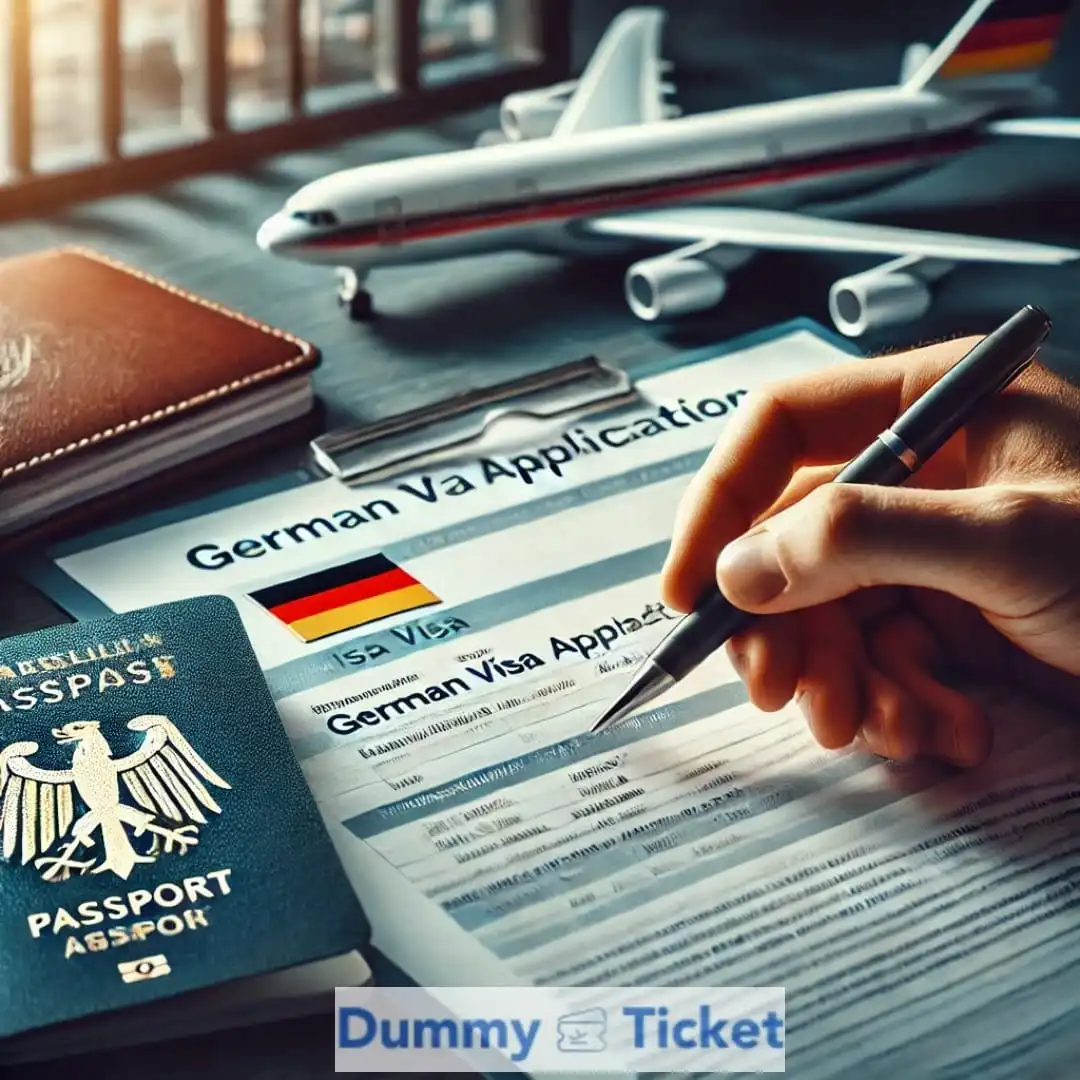Schengen Visa to Germany: Everything You Need to Know
A Schengen visa allows the holder to travel freely between the countries of the Schengen Area, which includes 27 European countries. Germany is one of the most attractive destinations for travelers for purposes such as work, study, tourism, or even visiting family. Therefore, obtaining a Schengen visa to Germany requires understanding the required procedures and steps to ensure a successful visa application.
What is a Schengen Visa?
A Schengen visa is a visa that allows its holder to travel through all the countries in the Schengen Area. This area includes 26 European countries such as Germany, Austria, Belgium, France, the Netherlands, Sweden, Spain, Italy, Portugal, and more. If you receive a Schengen visa from Germany, you can travel easily between all these countries.
Types of Schengen Visas
There are various types of Schengen visas depending on the purpose of travel, including:
- Short-Term Schengen Visa (C): This is the most common visa granted for tourism, visiting friends or family, or short-term work.
- Long-Term Schengen Visa (D): This visa is granted to those planning to stay in Germany for more than 90 days, such as students or workers.
Types of Schengen Visas for Germany
The Schengen visa for Germany can vary depending on the purpose of travel, including the following types:
- Tourist for Germany Visa: Allows you to visit Germany for leisure and tourism purposes.
- Work for Germany Visa: Requires an invitation or a work contract from an entity in Germany and allows you to work for a specified period.
- Study Visa: Provides an opportunity for short-term study and usually requires an acceptance letter from a German educational institution.
- Family and Friends Visit Visa: Requires an invitation letter from someone residing in Germany.
- Medical Treatment Visa: Granted to individuals who need to receive medical treatment in Germany.
- Business Visa: Aimed at travelers for business purposes, such as attending conferences and meetings.
Required Documents for a Schengen Visa to Germany
To apply for a Schengen visa to Germany, a set of essential documents must be submitted, including:
- Valid Passport: The passport must be valid for at least 3 months after the return date and have at least two blank pages.
- Visa Application Form: The form must be completed accurately and submitted with the other documents.
- Photographs: Recent passport-sized photos according to the required specifications.
- Proof of Travel (Flight Reservation): You must provide a round-trip flight reservation.
- Proof of Accommodation: This could be a hotel booking or an invitation from someone residing in Germany.
- Travel Insurance: You need to present travel insurance that covers all medical expenses and hospitals during your stay in the Schengen Area.
- Proof of Financial Means: Documents that show you can financially support yourself during your stay in Germany.
How to Apply for a Schengen Visa to Germany
You can apply for a Schengen visa to Germany by following these steps:
- Determine the Type of Visa Required: Make sure you know which type of visa you need based on your travel purpose.
- Collect the Required Documents: Ensure that you gather all the essential documents listed above.
- Schedule an Appointment with the German Consulate: You can schedule an appointment at the German consulate in your country to submit your visa application.
- Pay the Visa Fee: Fees vary based on the type of visa, but it typically costs around 80 Euros.
- Attend an Interview: In some cases, the consulate may request an interview for further details regarding the purpose of your trip.
- Wait for Application Processing: Processing time can take 10 to 15 days, depending on the case.
Special Conditions for Traveling to Germany
When applying for a Schengen visa to Germany, there are some specific conditions you should be aware of:
- Apply in Advance: It is recommended to submit your application at least 15 days before your planned travel date.
- Arranging Travel within the Schengen Area: If you plan to visit other countries in addition to Germany, your first point of entry should be Germany.
- Prepare for an Interview: The German embassy may ask for additional information or documents.
Common Reasons for Applying for a Schengen Visa to Germany
- Tourism: Whether you want to visit Germany's tourist attractions or explore German culture.
- Work: If you are applying for a job, attending a conference, or a business meeting in Germany.
- Study: If you want to study at a German university or school.
- Visiting Family or Friends: You can apply to visit family members or friends residing in Germany.
Business Schengen Visas to Germany
If you are applying for a business Schengen visa to Germany, you need to provide the following additional documents:
- Official Invitation: A letter of invitation from a company or organization in Germany.
- Employer Letter: A letter from your employer in your home country explaining the reason and duration of the trip.
- Details of Scheduled Business Meetings.
Important Notes When Applying for a Schengen Visa to Germany
- Stay Duration: You cannot stay in Germany or any Schengen country for more than 90 days within a 180-day period.
- Visa Refusal: If your visa application is rejected, you can appeal or reapply with additional supporting documents.
- Multiple-Entry Visas: If you plan to visit Germany multiple times, you can apply for a multiple-entry Schengen visa.
Benefits of the Visa
Once you obtain a Schengen visa to Germany, you can enjoy many benefits, such as the freedom to travel between the Schengen Area countries without needing additional visas.
Obtaining a Schengen visa to Germany is important for travelers who plan to visit this beautiful country for work, study, or tourism. By following the correct steps and preparing the necessary documents, you can increase your chances of a successful visa application and enjoy your stay in Germany and neighboring countries.
Types of Schengen Visas Germany
Schengen visas are classified into several types based on the purpose of travel and the length of stay, allowing the holder to travel freely between Schengen Area countries. These visas vary depending on the purpose of the trip, whether for tourism, business, study, or visiting family. Here are the main types of Schengen visas:
1. Short-Term Schengen Visa (Type C)
This is the most common visa, intended for people planning to visit Schengen countries for a short period (less than 90 days within a 180-day period). It includes the following types:
- Tourist Visa: Granted to tourists wishing to visit Schengen countries to enjoy the tourist attractions or travel.
- Family or Friends Visit Visa: If you plan to visit family members or friends living in Schengen countries.
- Short-Term Work Visa: Granted to those going to Schengen countries for short-term work, such as attending a meeting, conference, or training.
- Medical Visa: Granted to people visiting Schengen countries for medical treatment.
- Cultural or Sports Visa: Granted to participants in cultural or sports events or any other scheduled activities.
2. Long-Term Schengen Visa (Type D)
This visa is granted to people planning to stay in Schengen countries for more than 90 days. It includes the following types:
- Student Visa: Granted to students planning to study in Schengen countries for an extended period.
- Long-Term Work Visa: Granted to individuals who have received a job offer in a Schengen country and wish to work there for longer than 90 days.
- Family Reunification Visa: Granted to family members wishing to join a relative residing in a Schengen country.
- Research Visa: Granted to researchers planning to work on a research project in Schengen countries.
3. Multiple-Entry Schengen Visa
This Schengen visa allows the holder to enter Schengen countries multiple times during the visa's validity period. It can be either short-term or long-term and permits travel between Schengen countries according to the purpose of the trip. You must provide evidence that frequent travel is necessary, such as ongoing business or multiple visits.
4. Single-Entry Schengen Visa
This visa allows the holder to enter Schengen countries only once during the visa's validity period. Once you leave the Schengen Area, you cannot return without applying for a new visa.
5. Multiple-Entry Schengen Visa
A multiple-entry visa grants the holder the right to enter Schengen countries multiple times during the visa's validity period, which can be short (90 days) or long-term. This type of visa is useful for travelers who need to visit Schengen countries repeatedly.
6. Schengen Airport Transit Visa
This visa is specifically for travelers who pass through a Schengen airport on their way to another destination outside the Schengen Area. You are required to stay in the airport transit area and not leave for the city or country where the airport is located.
7. Business Schengen Visa
This visa is granted to people traveling to Schengen countries for business purposes. It may include attending meetings, conferences, signing contracts, or any other type of business activity. A business invitation from a company or organization in a Schengen country is required for this visa.
8. Schengen Research Visa
This visa is granted to researchers planning to conduct research projects in Schengen countries. This visa requires approval from the institutions or universities with which the researcher is collaborating.
Choosing the Right Schengen Visa Type
Choosing the correct type of visa depends on the purpose of your visit. Each type of visa comes with specific conditions and requirements. It’s also important to note that the Schengen Area includes various countries, and requirements may slightly differ from one country to another. Therefore, it’s always advisable to check with the German consulate or embassy, or any other Schengen country, for the most accurate information.
Schengen Study Visa for Germany
Germany is one of the most attractive destinations for international students in Europe and worldwide, thanks to its high-quality education and excellent universities that offer academic programs in various fields. If you are thinking of studying in Germany, the first step is to obtain a Schengen study visa. In this article, we will cover everything you need to know about the Schengen study visa for Germany, from procedures and requirements to tips that can simplify the application process.
What is a Schengen Study Visa?
A Schengen study visa is a visa that allows international students to live and study in any of the Schengen Area countries, which include 26 European countries. For Germany, this visa is necessary for non-EU or non-EEA students who wish to pursue their studies at German universities or educational institutions. However, if you plan to stay in Germany for more than 90 days, you will need a long-term study visa (Type D).
Requirements for a Schengen Study Visa to Germany
When applying for a Schengen study visa to Germany, you must meet some basic requirements, including:
- Passport: Your passport must be valid for at least 3 months after your return from Germany. It should also contain at least two blank pages.
- Visa Application Form: You must complete the visa application form provided by the German embassy or consulate in your country. This form is available online and can be filled out before applying.
- Photographs: You need to submit two recent passport-sized photographs that meet the consulate's specifications.
- Proof of Admission to a University or Educational Institution: You must provide an official acceptance letter from a recognized university or educational institution in Germany. This acceptance should be unconditional and must detail the academic program you will be enrolling in.
- Proof of Financial Capability: You need to prove that you can cover your living expenses during your studies in Germany. Typically, you must show a certain amount of money in a bank account, such as at least €10,236 for the academic year (based on current values).
- Health Insurance: You must provide proof of health insurance coverage for the entire duration of your studies in Germany. This insurance can be from a recognized German company or an international provider, as long as it provides adequate coverage.
- Cover Letter: In some cases, you may be required to submit a cover letter explaining why you chose Germany as your study destination and what your future academic and career plans are.
- Proof of Accommodation: You may need to provide evidence of your accommodation in Germany, whether it’s a hotel reservation, a rental agreement, or an invitation letter from a relative or friend in Germany.
- Visa Application Fee: There is usually a fee for submitting a visa application, which is approximately €75 (subject to change depending on consulate policies).
Steps to Apply for a Schengen Study Visa to Germany
Once you are ready to apply for the Schengen study visa, follow these steps carefully:
- Research Universities or Institutions: Before applying for the visa, make sure you have already applied to and received official acceptance from a university or institution in Germany. Choose an academic program that aligns with your educational goals.
- Prepare Required Documents: Gather all required documents and ensure everything is complete. Make sure all documents are translated into German or English, if necessary.
- Schedule an Appointment with the Consulate: Book an appointment with the German consulate in your country to submit your visa application. Some consulates may require you to schedule an appointment online.
- Submit Documents and Attend the Interview: On the scheduled date, submit all required documents. You may be asked to attend a personal interview at the consulate where your documents and personal details will be reviewed.
- Wait for a Decision: After submitting your application, visa processing typically takes about 10-15 days. However, the process may take longer if additional information or checks are needed.
- Receive the Visa: If your application is approved, you can collect your visa from the consulate. Make sure to carefully review the visa to ensure all details are correct.
Important Tips for Obtaining a Schengen Study Visa for Germany
Here are some tips to help streamline the process of obtaining a Schengen study visa for Germany:
- Start Early: Apply for the visa well in advance (3 to 6 months before your study start date) to avoid any unexpected delays.
- Ensure Complete Documentation: Make sure all documents you submit are complete and accurate.
- Consult the German Consulate: Double-check the visa requirements via the German consulate’s website in your country, as they may vary slightly from one country to another.
- Prepare for the Interview: If there’s an interview, be well-prepared and ready to answer questions about your study plans and future goals.
Advantages of Studying in Germany
Studying in Germany offers many benefits that make it a desirable destination for international students, including:
- High-Quality Education: German universities offer world-class academic programs in various fields.
- Post-Graduation Work Opportunities: International students are allowed to stay in Germany after graduation to search for work.
- Low Living Costs: Compared to other European countries, Germany has relatively low living costs, especially in smaller cities.
- Research Opportunities: Germany is known for its advanced research environment, making it an excellent choice for students interested in research.
- Scholarships: The German government offers scholarships for international students, such as the DAAD scholarship.
Living in Germany as an International Student
Once you arrive in Germany, you will find a wide range of opportunities and services available for international students. From student housing to academic support, German universities provide a comprehensive educational environment. Germany also offers a variety of social and cultural activities that students can participate in.
Obtaining a Schengen study visa for Germany is an essential step toward achieving your academic and career goals. By following the correct steps, preparing the required documents, and reviewing the specific requirements, you can simplify the application process and increase your chances of obtaining the visa successfully. Despite any challenges you may face, remember that Germany offers an amazing educational environment that opens up great learning and growth opportunities.
The Relationship Between Dummy Flight Ticket and Schengen Student Visa for Germany
When applying for a Schengen student visa for Germany, a temporary flight booking may be part of the required documentation requested by the embassy or consulate. However, it's important to understand that a temporary flight booking is not a mandatory part of the visa requirements; rather, it serves as preliminary evidence of your intent to travel.
1. What is a Temporary Flight Booking?
A temporary flight booking is an unpaid flight reservation or a booking that can be canceled or modified. This booking is made online through travel agencies or booking websites. It allows you to prove your intent to travel to Germany at a specific time without paying for the full ticket.
2. Why is a Temporary Flight Booking Required?
When applying for a Schengen student visa, the German consulate typically requests applicants to provide proof of their travel plans. Although a temporary flight booking is not strictly required in all cases, many consulates request it as part of the documents that accompany the visa application.
The reason for this is that consulates need to verify the applicant’s intention to travel to Germany at the right time, and a flight booking demonstrates that you plan to arrive in Germany during the academic period you’ve been accepted for.
3. Do I Have to Pay for the Full Ticket Before Applying for a Schengen Visa?
Typically, you are not required to pay for the full ticket before submitting your visa application. This is why a temporary flight booking is a convenient solution. Actual flight tickets can be expensive and are only necessary after receiving your visa.
4. How Does a Temporary Flight Booking Help Enhance Your Visa Application?
Presenting a temporary flight booking throughDummy-ticket.net can strengthen your visa application because it shows the consulate that you’ve planned your trip carefully and that you will return to your home country after completing your studies in Germany. In some cases, a temporary flight booking can be tangible evidence that aids the consulate in making a positive decision regarding your visa.
5. Other Advantages of a Temporary Flight Booking:
Lower Cost: A temporary flight booking through Dummy-ticket.net does not require you to pay for the full ticket, saving you money while waiting for your visa.
Easy Cancellation or Modification: If you don’t receive the visa or your plans change, you can easily cancel or modify the booking.
Meeting Visa Requirements Quickly: A temporary flight booking can speed up the process of submitting documents and complying with consulate requirements.
6. How to Book a Temporary Flight?
You can book a temporary flight online through various Dummy-ticket.net services. Here are the steps to follow:
- Visit the website of a reliable travel agency offering temporary flight booking services.
- Choose the travel date and departure that matches your study period in Germany.
- Ensure the booking is cancellable or modifiable in case your circumstances change.
- Save a copy of the booking to attach it to your visa application.
7. Does a Temporary Flight Booking Guarantee a Visa?
Although a temporary flight booking may help demonstrate your intent to travel, it does not guarantee that you will receive a Schengen visa. The Schengen visa depends on the embassy or consulate’s evaluation of all your documents, including financial proof, university acceptance, health insurance, and whether you belong to the group of students required to submit comprehensive applications.
While a temporary flight booking is not a core document requested by German embassies when applying for a Schengen student visa, it is a useful document that can facilitate the visa process. It provides proof of your intent to travel and shows that you have planned your trip to Germany. Therefore, it is advisable to secure a temporary flight booking before applying as part of the overall process for obtaining a Schengen student visa.




